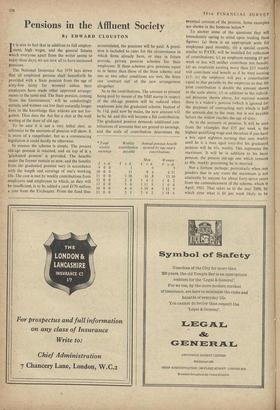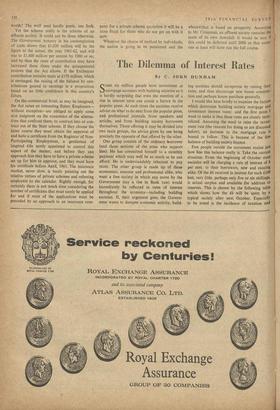Pensions in the Affluent Society By EDWARD CLOUSTON TT is
nice to feel that in addition to full employ- ' ment, high wages, and the general fatness which everyone apart from the writer seems to enjoy these days, we are now all to have increased pensions.
The National Insurance Act 1959 lays down that all employed persons shall henceforth be provided with a State pension from the age of sixty-five (sixty for women) unless their employers have made other approved arrange- ments to the same end. The State pension, coming 'from the Government,' will be comfortingly certain, and women can live their naturally longer lives in the knowledge that widows are not for- gotten. Thus does the Act fire a shot at the wolf waiting at the door of old age.
To be sure it is not a very lethal shot, as referene to the amounts of pension will show. It is more of a rangefinder, but as a commencing legislation it could hardly be otherwise.
In essence the scheme is simple. The present old-age pension is retained, and on top of it a 'graduated pension' is provided. The benefits under the former remain as now, and the benefits from the graduated pension vary in accordance with the length and, earnings of one's working life. The cost is met by weekly contributions from employers and employees to which, as they will be insufficient, is to be added a cool £170 million a year from the Exchequer. From the fund thus accumulated, the pensions will be paid. A provi- sion is included to cater for the circumstance in which firms already have, or may in future provide, private pension schemes for their employees. If these schemes give pensions equal to or better than those of the State scheme, and one or two other conditions are met, the firms can 'contract out' of the new arrangement altogether.
As to the contributions. The amount at present being paid by means of the NHI stamp in respect of the old-age pension will be reduced when employees join the graduated scheme. Instead of 9s. lld. paid now by males, the new amount will be 8s. 4d. and this will become a flit contribution. The graduated pension demands additional con- tributions of amounts that are geared'to earnings, and the scale of contribution determines the
Weekly Annual pension benefit contribution secured by one year's payable contributions
s. d. s. d.
Men s. d. Women s. d.
9
0 0
1
9
7
10
0 0
11
8 4
6 11
11
0 0
1 10
16 8
13 10 12 0 0 2
8
1 4 2 1 0 2 13 0 0
3 6
1 11 9 1 6 6 14 0 0
4 4
1 19 4 1 12 9 15 0 0
5
2 6 2 1 18 6
* Total weekly earnings
eventual amount of the pension. Some examples are shown in the footnote below.* To answer some of the questions that will immediately spring to mind upon reading these figures: (a) there is an appropriate scale for employees paid monthly; (b) a special system, similar to PAYE, will be installed for collection of contributions; (c) an employee earning £9 per week or less will neither contribute nor benefit; (d) an employee earning more than £15 weekly will contribute and benefit as if he were earning £15; (e) the employer will pay a contribution equal to that payable by the employee so that the joint contribution is double the amount shown in the scale above; (f) in addition to the individ- ual pensions shown above, for married women there is a widow's pension (which is ignored for the purposes of contracting out) which is half the amount due to the man, but is not payable before the widow reaches the age of sixty.
As to the amounts of pension. It will be seen from the examples that £15 per week is the highest qualifying wage and therefore if you have a boy aged eighteen earning that sum weekly until he is a man aged sixty-five his graduated pension will be 41s. weekly This represents the maximum. It will be in addition to his basic pension, the present old-age one which remains at 80s. weekly presuming he is married.
Not a fortune perhaps; particularly when one ponders that in any event the maximum is not attainable by anyone for about forty-seven years from the commencement of the scheme, which is April, 1961. That takes us to the year 2008, by which time what is £6 per week likely to be worth? The wolf need hardly panic, one feels.
Yet the scheme really is the scheme of an affluent society. It could not be done otherwise. The Government Actuary in his contemplation of costs shows that £1,020 million will be the figure at the outset, the year 1961-62, and will rise to £1,400 million per annum by 1980 or so; and by then the rates of contribution may have increased three times under the quinquennial reviews that the Act allows. If the Exchequer contribution remains static at £170 million, which is envisaged, the raising of the balance by con- tributions geared to earnings is a proposition based on no little confidence in this country's future.
On the commercial front, as may be imagined, the Act raises an interesting flutter. Employers— without exception—are obliged to apply some nice judgment on the economics of the alterna- tives that confront them; to contract into or con- tract out of the State scheme. If they choose the latter course they must obtain the approval of and have a certificate from the Registrar of Non- Participating Employment, a gentleman of inspired title newly appointed to control this aspect of the matter; and before they can approach him they have to have a private scheme set up for him to approve, and they must have his certificate before April, 1961. The insurance market, never slow, is busily pointing out the relative virtues of private schemes and referring employers to the calendar. Rightly enough, for certainly there is not much time considering the number of certificates that must surely be applied for and if most of the applications must be preceded by an approach to an insurance com- pany for a private scheme quotation it will be a close finish for those who do not get on with it now.
Whatever the choice of method by individuals, the nation is going to be pensioned and the wherewithal is based on prosperity. Accordini to Mr. Crossman, an affluent society contains the seeds of its own downfall. It would be nice 11 this could be deferred until 2008 so that some. one at least will have run the full course.























































 Previous page
Previous page